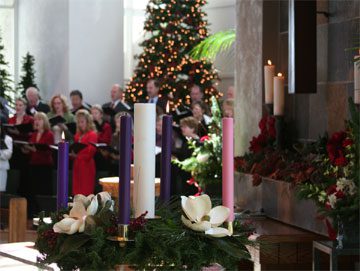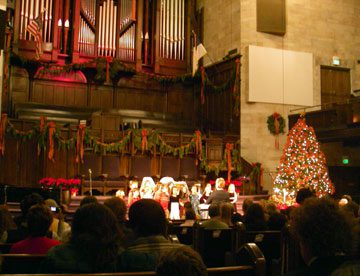I am a proud “Adventophile,” a lover of Advent.
But I wasn’t raised this way. I didn’t start valuing Advent until I became the Senior Pastor of Irvine Presbyterian Church in Southern California.
Why? Why was Advent growing on me? Why had I come to love this season that had mattered so little in the first 35 years of my life? Why was I becoming, of all things, an Adventophile?

This was happening to me for two main reasons. First, I found that observing Advent enriched my celebration of Christmas. Taking three weeks to focus on the hope of Christ’s coming made me much more joyful when I finally got to celebrate it. In general, if you stimulate your expectation for some event, you’ll be more excited when that event occurs. So, the more I felt my yearning for God’s presence during Advent, the more I was thrilled with his coming to dwell among us in Jesus. The more I got in touch with my own need for a Savior, the more I rejoiced at the Savior’s birth.
Second, I found in Advent a solution to the age-old problem of secular Christmas vs. spiritual Christmas. If you’re a Christian, you know what I mean. We acknowledge that Christmas is, most of all, a time to celebrate the birth of Jesus. It’s a holiday that focuses on the fact and the meaning of the Incarnation, the Word of God made flesh. Yet, given the powerful draw of the secular traditions of Christmas, we spend most of our time preparing, not for a celebration of the birth of Jesus, but for fulfilling the demands of the season. We have to buy lots of presents for lots of people and make sure they are all wrapped and delivered. We have parties to attend and parties to host. We have relatives who come to visit or, alternatively, we are the relatives who go elsewhere to visit. We have to send out Christmas cards, making sure our addresses are right and that they get on all the envelopes. If we have younger children, we may very well spend hours trying to assemble gifts that come with sketchy instructions written by someone for whom English is, at best, a third language. And so on, and so on, and so on. You know what I’m talking about.
Meanwhile, we hear our pastors telling us that we’re spending too much time and money in secular celebrations and not focusing enough on the real meaning of Christmas. Religious posters proclaim: “Jesus is the reason for the season” and “Don’t take Christ out of Christmas.” But, in fact, Jesus faces heavy competition from retailers, relatives, and revelers. So what’s a Christian to do?
In my idealistic twenties, I thought about downsizing my celebrations of Christmas. That would have been quite a sacrifice for a Christmasophile, but it was one I was willing to make. At one point, Itried to convince some family members that we should make Christmas Day an entirely “spiritual” holiday, one in which we focus only on the birth of Jesus. That meant, in particular, no presents, no secret visits from Santa, no secular Christmas songs. (Yes, I did actually suggest this, believe it or not.)
Yet I did not let my Christian Grinchiness complete obliterate Christmas traditions. I didn’t want us to give up secular festivities or gift giving. I simply wanted to change the timing. “Let’s do that stuff on New Year’s Eve,” I argued. “Not only is this holiday very close to Christmas, but also, if we give gifts on New Year’s, we’ll be able to shop in the post-Christmas sales and that will save a lot of money.” Ah, what persuasive logic! What religious fervor combined with practicality!
But, as you might expect, none of my relatives was persuaded, least of all my wife. Our secular and familial Christmas traditions were too embedded in our lives and, I might add, greatly loved. The truth is, I’m part of a family of Christmasophiles. So, I abandoned my effort to de-secularize Christmas.
As I entered my early thirties, I tried to emphasize the Christian aspects of Christmas in the days leading up to the holiday. Yet I seemed to be fighting a losing battle, not just with my family and my culture, but also with myself. I needed some way to focus my mind and heart on God. I needed some new traditions that would help me. And I needed social support for these traditions, the sort of thing that comes from a community of shared belief and practice. Then I discovered Advent. Observing Advent during December helped me draw near to God in a way that I had not been able to do before. I still engaged in the secular celebrations of Christmas–happily so, I might add. But I also added several new, time-tested practices that tuned my heart to resonate with the deeper meaning of the coming of Christ.
I am not alone as one whose life has been enriched by the discovery of Advent. In fact, many others have had similar experiences to mine. Since 2004, I have been blogging about Advent. During the past eight years, I have received dozens of emails from people who have shared their own love of Advent. Some grew up with Advent traditions. Many discovered Advent later in life, much as I did. All have found that observing Advent enriches their celebration of Christmas and allows them to have a precious, peaceful, God-focused experience during a generally hectic holiday season.
What I have experienced in my own life, and what others have shared with me, reflects a much larger movement among Christians. Twenty-five years ago, you would have been hard pressed to find Advent celebrations outside of highly liturgical traditions (Anglican, Lutheran, Catholic, etc.). Today, many non-liturgical churches, independent churches, evangelical churches, and the like recognize Advent and participate in some of its rites. This is especially true among younger Christians who are open to adopting classic Christian practices for worship and devotion. Those who seek, in Robert Webber’s classic phrase, “ancient-future” worship are well on their way to becoming Adventophiles.
In tomorrow’s post, I share a bit more about the different ways we can celebrate Advent.
Some Advent Resources
Introduction to Advent – an article on my blog
Introduction to the Christian Year – an article on my blog.
Discovering Advent: How to Experience the Power of Waiting on God at Christmastime, my e-book, available from Amazon and Barnes & Noble.












